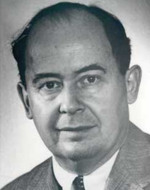


31. John von Neumann
President 1951–1952
Ph.D. University of Budapest, Hungary, 1926
John von Neumann is perhaps best known known for his work in the early development of computers: As director of the Electronic Computer Project at Princeton's Institute for Advanced Study (1945-1955), he developed MANIAC (mathematical analyzer, numerical integrator and computer), which was at the time the fastest computer of its kind. He also made important contributions in the fields of mathematical logic, the foundations of quantum mechanics, economics and game theory.
He was born in Budapest and received his undergraduate degree in chemical engineering there before coming to the U.S. His principal academic appointment was as professor at the Institute for Advanced Study, Princeton, NJ, from 1933 until his death in 1957, and he also worked on the Manhattan project to develop atomic weapons. He began the study of game theory and co-wrote the classic text Theory of Games and Economic Behaviour with Oskar Morgenstern. In 1938, von Neumann was awarded the AMS Bôcher Memorial Prize. He was one of the most outstanding and best known mathematicians to serve as AMS president, and was a member of the U.S. National Academy of Sciences.
Additional information
 MR Author Profile
MR Author Profile- History of the Second Fifty Years: American Mathematical Society, 1939-1988, by Everett Pitcher (AMS, 1988), which includes AMS Presidents from 1939-1988 (and reports on all aspects of the Society during the period).
- The MacTutor History of Mathematics Archive
- Mathematics Genealogy Project
- John von Neumann, "Distinguished Members Gallery," National Academy of Sciences website
- John Louis von Neumann, History of Computing, Virginia Tech/Norfolk State University website
- John von Neumann, "Big Ideas," Educational Broadcasting Corporation (includes online video)
- Who's That Mathematician? Images from the Paul R. Halmos Photograph Collection

